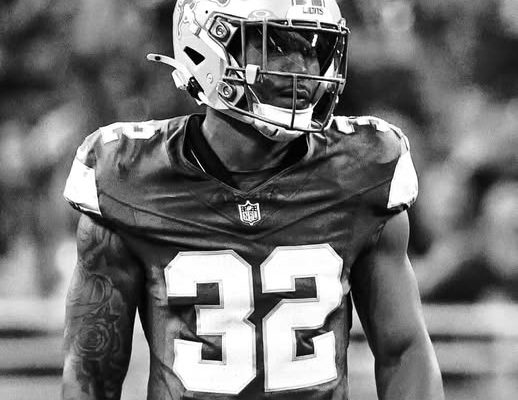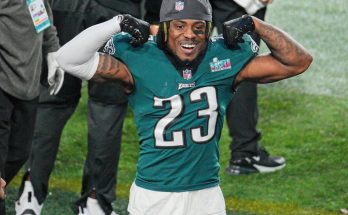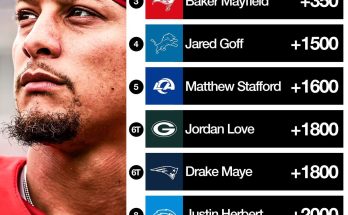The NFL’s decision to suspend Brian Branch for one game without pay after the incident following the Chiefs game has reverberated through league circles, drawing criticism, support, and a deeper conversation about player conduct, league consistency, and the pressures of professional football. That single‑game ban marks a clear disciplinary stance—but also brings into focus the complexities of policing emotional reactions, balancing accountability with empathy, and preserving both player safety and competitive integrity.
The events that precipitated the suspension unfolded immediately after the Lions’ 30–17 loss in Kansas City, a game already charged with intensity and competitive stakes. After the final whistle and the customary postgame handshake line, what might have been a routine exchange instead became a flashpoint. Patrick Mahomes extended his hand toward Brian Branch, and Branch walked past without reciprocating. As Branch neglected the handshake, JuJu Smith‑Schuster approached, exchanged words, and in a split second Branch struck him, connecting with his facemask. The punch dropped Smith‑Schuster to the turf, and a broader brawl erupted with players from both teams swirling into the mix. Smith‑Schuster emerged with a bloody nose, and the on-field melee drew widespread attention.
In his official communication to Branch, NFL Vice President of Football Operations Jon Runyan cited the violation as an “aggressive, non‑football act” that “posed a serious risk of injury” and “clearly violated the standards of conduct and sportsmanship expected of NFL players.” He made clear that Branch’s behavior “reflected poorly on the NFL” and insisted there was “no place” for such conduct in the game. Branch was immediately suspended for one game, unpaid, and informed that he would be eligible to return to the active roster following his suspension. Branch confirmed he would pursue an appeal
Branch himself offered a contrite acknowledgment of both the moment’s stakes and his failure to contain his reaction: “I did a little childish thing,” he said, citing frustration with what he perceived were uncalled fouls, particularly a block in the back, and noting that he felt “bullied” during the game when referees failed to intervene. He admitted he shouldn’t have hit Smith‑Schuster and called his behavior “childish.
Lions head coach Dan Campbell—while expressing personal support for Branch—did not shy away from condemning the act. On camera, Campbell stated: “I love Brian Branch, but what he did is inexcusable,” and made it clear that the organization would not tolerate such behavior. Campbell also publicly apologized to the Chiefs, to Smith‑Schuster, and to Kansas City Coach Andy Reid. Campbell later described the incident as a teaching moment, acknowledging Branch’s hearts and talents while stressing that actions have consequences.
Public reaction to the suspension has been split. Some argue the punishment was too lenient, given the risk of injury and the visible escalation of conflict. Others contend that a one‑game suspension is defensible: the act occurred after the play, was spontaneous and emotional, and not premeditated, distinguishing it from deliberate dirty play during a game. Critics also point to possible inconsistency: the league has, in past instances, punished far more severe on-field infractions with fines rather than suspensions, prompting questions about where lines of discipline are drawn.
The nature of the incident complicates any neat categorization. Because the clash happened postgame, it falls outside the normal boundaries of in-play conduct, yet it occurred in the immediate emotional aftermath of a heated battle. The league has to deter violent reactions, especially those that might spark further chaos or injury, but also has to weigh players’ emotional stakes and stresses, especially in high-intensity settings. Branch’s criticism of missed calls and perceived bullying highlight the pressures defenders endure—on every rep, they face physical wear, officiating judgments, and emotional temptations. The suspension thus serves not only as punishment but also as a signal: emotional controls are part of professional expectations.
Missing a game has direct consequences—beyond the immediate competitive impact. Branch will forfeit a week’s pay, depriving him of salary that could amount to a substantial sum depending on contract structure. It also adds to a public record of disciplinary actions, which could influence future treatment of his behavior. The absence may weaken Detroit’s defense for that matchup, forcing the coaching staff to adjust coverages, personnel rotations, and schemes. The optics matter: a player suspended for conduct reflects not just on himself, but on locker room culture, coaching supervision, and broader organizational discipline.
The suspension also underscores league efforts to preserve its image and authority. In a highly scrutinized, national broadcast, letting such a postgame brawl go unpunished—or punishing only nominally—would risk eroding public confidence in the NFL’s commitment to player safety and sportsmanship. At the same time, overly harsh punishments for emotional outbursts risk alienating players or seeming overly authoritarian. By imposing a one‑game, unpaid suspension, the league stakes a middle ground: serious enough to send a message, but constrained enough to allow for context, appeal, and rehabilitation.
Branch’s appeal introduces further uncertainty. A successful appeal could reinstate him earlier, although likely not retroactively compensate for lost pay. A denied appeal would affirm the league’s original judgment and possibly discourage similar behavior. The appeal process in the NFL typically involves a hearing officer jointly appointed by the league and the Players Association—a setup intended to balance league authority and player rights.
This incident adds to Branch’s disciplinary track record. He has faced fines previously for unsportsmanlike conduct and facemask penalties. That context may have influenced the decision: repeated infractions can erode goodwill and justify stricter responses. For Branch, this moment carries personal stakes: beyond the lost salary and game, his reputation, relationships with teammates and coaches, and long-term evaluations could be affected.
In responding to the suspension, Branch, his coaches, teammates, and the broader NFL community may interpret this as a turning point. For Branch, it’s a moment to demonstrate growth, accountability, and emotional maturity. For Detroit, it’s a test of leadership and team resilience under adversity. For the league, it’s another data point in a patchwork of disciplinary precedent, one that administrators will observe when handling future incidents.
In summary, the consequence of a one game suspension without pay for Brian Branch carries weight well beyond a missed contest. It reflects the NFL’s standards for conduct, the expectations on players to manage emotions under pressure, and the intricate balance between discipline and understanding in a high-stakes environment. The incident underscores how a split-second decision, fueled by frustration and provocation, can ripple across careers, teams, and league policy. As Branch serves his suspension and weighs an appeal, the broader football community watches closely—not just for the outcome, but for how lessons are learned and discipline is shaped moving forward.



